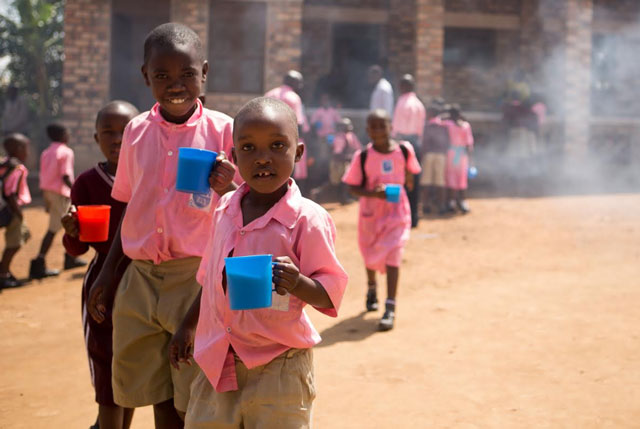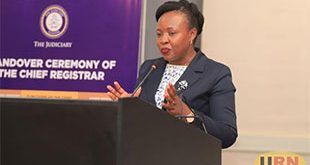
Kampala, Uganda | THE INDEPENDENT | The National Resistance Movement-NRM is proposing to introduce a national school feeding programme and remove of all forms of school fees for learners in public schools.
The two ideas are among the list of proposals in the education sector highlighted in the party manifesto for 2021 to 2026 which was recently launched by their flag bearer Yoweri Kaguta Museveni under the theme; Securing Your Future.
If re-elected, this would be another fundamental measure introduced by president Museveni since he instituted Universal Primary Education in the 1996 election season when he tussled it out with Dr Paulo Kawanga Ssemogerere. He has since introduced Universal Secondary Education and abolished Graduated Tax.
Although education is free, some children fail to access it because of additional charges especially uniform, lunch, PTA (Parents Teachers Association). There would then be no excuse whatsoever for any child of school going age to be out of school since even pregnancy is no longer a ground for leaving school.
The NRM argues that the programme will improve the nutrition and health of school going children. Additionally and equally important, it would generate wealth for farmers all over the country as it creates demand and market for agricultural produce.
Joe Billy Kisozi, a senior educationist notes that the idea being mooted is ‘very beautiful’ as having breakfast and midday meal is critical to the teaching-learning process. Kisozi who has taught at different levels from early childhood learning to teacher training institutions notes that when a child at any level is hungry, there is no learning that takes place.
However, he is worried that it might be yet another pledge that may not see the light of the day. Referring to the 2015 renowned sanitary pads pledge which is yet to be fulfilled to date, Kisozi says on implementation, the government needs to think of the best alternatives to deliver the promise.
To him, the implementation must be involving the school, parents, and learners rather than thinking of 100 percent funding from the central government.
If implemented, this will not exactly be the first time government is providing free food to school children. Available documents indicate that the school feeding programme was implemented in Uganda after the 1979 war, covering all schools.
During the launch of the Universal Primary Education-UPE programme in 1997, parents were expected to feed their children, leaving the other tasks to the government as stipulated in Section 5(2) of the Education Act 2008.
However, many parents failed to provide lunch to their children, which left the pupils to starve at school until they return home. There were several efforts by several stakeholders including school authorities, district leaders, and development partners to encourage parents to provide meals to their children in vain.
One of the reports by the National Planning Authority report on Uganda’s Sustainable Development Goal II showed that seven children in every 10 school-going learners do not get a meal while at school.
To arrest the situation, the government introduced a national guideline on school feeding designed to assist districts in the development and implementation of district school feeding policies ensuring payment of a uniform amount of money towards the feeding programme with variations between urban and rural schools.
But, Paul Bwana, Sembabule senior education officer says that most of their efforts to ensure feeding at school have been failed by those who contradict presidential directives of informing Resident District Commissioners to arrest headteachers charging parents extra fees, saying they were defying the spirit of UPE.
Bwana says as a result, many headteachers shied away from collecting any fees from parents.
After identifying the impact of the challenge, the First Lady and Minister of Education Janet Museveni embarked on a countrywide tour to popularize the school feeding campaign, calling upon parents to take up the responsibility to cater to their children’s needs like food.
The first lady was calling upon parents to prepare a meal and put them in containers for their children to enjoy. However, Bwana says that this cannot be achieved in rural areas where people eat one meal a day.
He further adds that in some areas where it had worked, parents could pack leftovers from the evening meals which by midday could either be cold or bad.
Meanwhile, NRM is also suggesting to conduct village assemblies in all the 68,000 villages of Uganda to pass a resolution on school charges. During his recent campaign tours, President Museveni has been noting that the resolution of the assemblies will inform whether a parent should contribute something towards the education of their learner or education remains completely free of charge.
Related promises include recruitment of additional teachers to negate the need for PTA contribution and continue increment of the budget allocation to textbooks and scholastic materials.
******
URN
 The Independent Uganda: You get the Truth we Pay the Price
The Independent Uganda: You get the Truth we Pay the Price




Nrm found ugandan students being given food at sch, books, pens & pencils by the former govmts of which it scrambled & mis-used all those funds to fat-belly them selves we love the president but the antourchables he gave birth to are crooks & deadly self-minded.